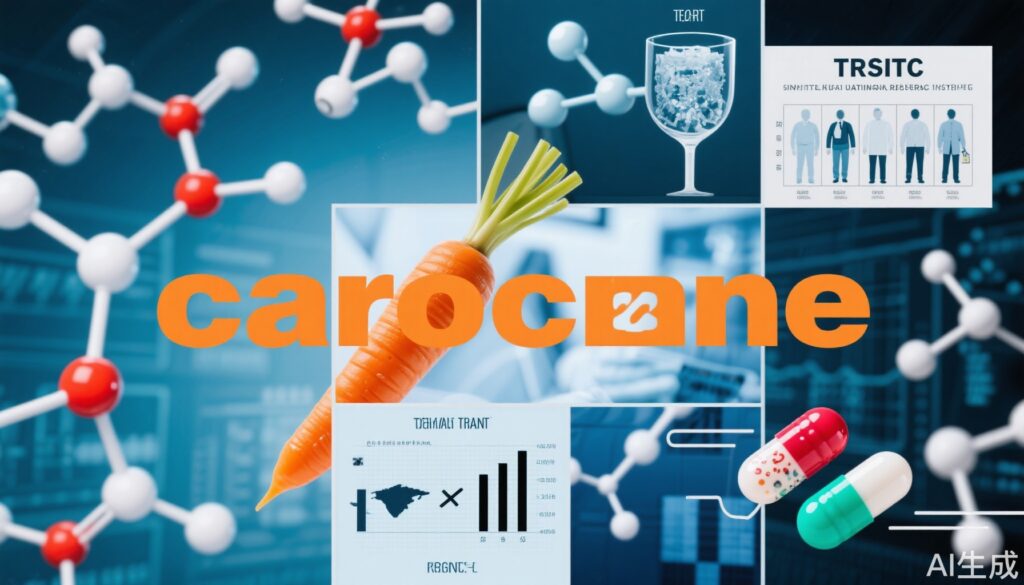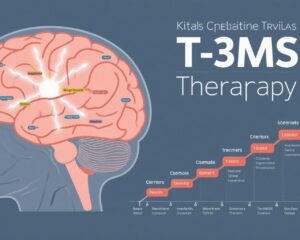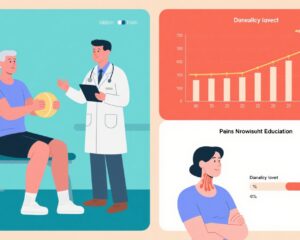Highlights
- Carotene supplementation, particularly β-carotene, improves provitamin A levels and erythropoiesis in vitamin A-deficient populations.
- Lutein and other carotenoids show potential to enhance cognitive function, especially working memory, though effects on clinical outcomes require further validation.
- Bioavailability of carotenoids can be significantly improved by co-consumption with fermented milk or dietary modifications, optimizing clinical effects.
- Supplementation with β-carotene carries potential risks including increased lung cancer and cardiovascular mortality in high-risk groups, highlighting the need for safety monitoring and understanding drug-nutrient interactions.
Background
Carotenoids, including α- and β-carotene, are fat-soluble pigments functioning as provitamin A precursors and antioxidants. Clinically, carotene supplementation targets vitamin A deficiency (VAD), prevalent in developing countries, and has been explored for cardiovascular, oncologic, and neurocognitive applications. The complexity of carotene’s bioavailability and interactions with drugs or nutrients warrants an evidence-based synthesis to guide clinical usage.
Key Content
Clinical Applications of Carotene
Vitamin A Deficiency and Hematologic Effects
A rigorous double-blind randomized controlled trial (RCT) involving 651 Malaysian children with VAD demonstrated that supplementation with red palm olein-enriched biscuits significantly increased circulating provitamin A carotenes (α- and β-carotene), retinol, hemoglobin, packed cell volume, mean corpuscular volume, and iron levels, concomitantly reducing microcytic anemia and inflammation (PMID: 38240773 IF: 4.3 Q1 ). This supports carotene’s role as a cost-effective intervention for improving erythropoiesis and ameliorating VAD-related morbidity.
Cognitive Function and Neuroprotection
In persons with relapse-remitting multiple sclerosis (RRMS), a single-blind RCT of 4-month 20 mg/d lutein supplementation showed significant increases in macular pigment optical density and serum lutein levels, with attendant improvements in attention and spatial memory task accuracy, though overall cognitive outcomes did not reach statistical significance (PMID: 37364683 IF: 3.8 Q2 ). Similarly, a 24-month randomized trial in cognitively healthy older adults reported that combined omega-3 fatty acid, carotenoid (including lutein, zeaxanthin), and vitamin E supplementation improved working memory performance dose-dependently (PMID: 34999335 IF: 7.4 Q1 ). Despite promising data, direct evidence for cognition preservation via carotene alone remains insufficient.
Bioavailability Enhancement
Carotenoid absorption is influenced by food matrix and co-factors. Human and animal studies demonstrated that co-consumption of β-carotene with milk fermented by lactic acid bacteria significantly increases carotenoid bioavailability, as evidenced by higher serum area under concentration-time curves (AUC) without dependence on cholesterol transport inhibition by ezetimibe (PMID: 32083646 IF: 6.9 Q1 ). Additionally, skin carotenoid levels, a biomarker for carotenoid intake, respond sensitively to dietary supplementation as measured via reflection spectroscopy in diverse populations (PMID: 36804322 IF: 3.8 Q2 , 36894250).
Carotene and Cardiovascular Disease, Cancer Prevention, and Safety
A large systematic review for the US Preventive Services Task Force, including 84 trials with over 739,000 participants, reported that β-carotene supplementation was associated with a statistically significant increased risk of lung cancer (OR 1.20) and cardiovascular mortality (OR 1.10), especially in high-risk individuals such as smokers (PMID: 35727272 IF: 55.0 Q1 ). Multivitamin use showed a modest cancer risk reduction overall, but β-carotene alone posed risks, underscoring the importance of population-specific safety assessment.
Interactions with Nutritional and Pharmacologic Factors
Studies indicate that high dietary calcium supplementation does not adversely affect β-carotene bioavailability from spinach-based meals (PMID: 28651681 IF: 3.0 Q2 ), whereas plant sterol and stanol intake reduces circulating β-carotene and other carotenoids modestly though within normal ranges (PMID: 27591863 IF: 4.3 Q1 ). These findings highlight potential nutrient-nutrient interactions impacting carotene status without clear clinical detriment.
Regarding drug interactions, evidence is limited but prudent clinical practice necessitates monitoring carotene supplementation in patients receiving therapies affecting fat absorption, lipid-lowering agents, or anticoagulants due to possible alterations in absorption or efficacy, although direct interactions with conventional drugs remain incompletely characterized in literature.
Expert Commentary
The clinical utility of carotene lies predominantly in preventing and managing VAD, where robust RCT data support improved hematologic and inflammatory markers. Emerging evidence suggests neuroprotective roles of lutein-enriched supplementation, but conclusive cognitive benefits require larger, controlled trials with longer follow-up. The consistent enhancement of carotene bioavailability by fermentation and dietary factors opens avenues to optimize nutrition-based interventions.
Safety concerns arise primarily in populations with susceptibility to lung cancer, emphasizing that isolated β-carotene supplementation in smokers or asbestos-exposed individuals is contraindicated. Current guidelines recommend carotenoids primarily through diet or multivitamins rather than monotherapy in these groups. There remains a critical knowledge gap regarding carotene’s pharmacokinetic interactions, warranting future systematic pharmacovigilance.
Conclusion
Carotene supplementation is an effective intervention for vitamin A deficiency, providing hematologic and anti-inflammatory benefits. Neurocognitive impact of carotenoid supplementation is promising but not definitive. Bioavailability enhancement strategies such as co-consumption with fermented dairy products may increase clinical effectiveness. However, supplementation risks, notably increased lung cancer and cardiovascular mortality in high-risk populations, necessitate cautious application. Comprehensive research into drug-carotene interactions and long-term safety profiles remains an unmet need to fully integrate carotene into evidence-based clinical practice.
References
- Sharif Z et al. Supplementation of red palm olein-enriched biscuits improves levels of provitamin A carotenes, iron, and erythropoiesis in vitamin A-deficient primary schoolchildren. Eur J Nutr. 2024 Apr;63(3):905-918. PMID: 38240773 IF: 4.3 Q1
- Weirich T et al. Randomized, Placebo-Controlled, Single-Blind Study of Lutein Supplementation on Carotenoid Status and Cognition in Persons with Multiple Sclerosis. J Nutr. 2023 Aug;153(8):2298-2311. PMID: 37364683 IF: 3.8 Q2
- Walk AM et al. Omega-3 fatty acid, carotenoid and vitamin E supplementation improves working memory in older adults: A randomised clinical trial. Clin Nutr. 2022 Feb;41(2):405-414. PMID: 34999335 IF: 7.4 Q1
- O’Connell MA et al. Exopolysaccharides from milk fermented by lactic acid bacteria enhance dietary carotenoid bioavailability. Am J Clin Nutr. 2020 Apr 1;111(4):903-914. PMID: 32083646 IF: 6.9 Q1
- Bjelakovic G et al. Vitamin and Mineral Supplements for the Primary Prevention of Cardiovascular Disease and Cancer: Updated Evidence Report and Systematic Review for the US Preventive Services Task Force. JAMA. 2022 Jun 21;327(23):2334-2347. PMID: 35727272 IF: 55.0 Q1
- Villegas R et al. No influence of supplemental dietary calcium intake on the bioavailability of spinach carotenoids in humans. Br J Nutr. 2017 Jun;117(11):1560-1569. PMID: 28651681 IF: 3.0 Q2
- Weidner C et al. Plasma fat-soluble vitamin and carotenoid concentrations after plant sterol and plant stanol consumption: a meta-analysis of randomized controlled trials. Eur J Nutr. 2017 Apr;56(3):909-923. PMID: 27591863 IF: 4.3 Q1




Very interesting topic, thanks for posting.